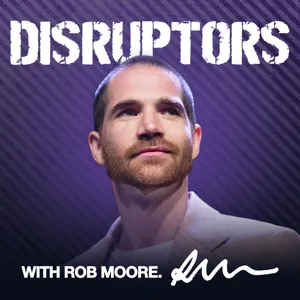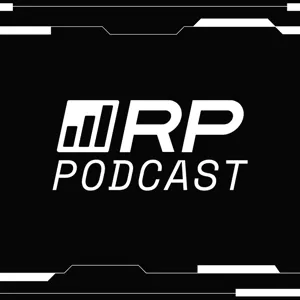Podcast Summary
David vs Goliath: The GameStop saga: A group of amateur investors, united on Reddit, successfully defied Wall Street predictions, inspiring a compelling movie and reminding us of the power of collective action.
The power of community and determination can challenge the financial industry's established norms. The GameStop stock situation showcased how a group of amateur investors, united on Reddit, successfully defied predictions made by Wall Street firms. This unexpected event, which unfolded during the pandemic, captivated the attention of Hollywood producer Aaron Ryder, who saw its potential for a compelling movie. The story of the underdogs banding together to challenge the financial system resonated with many, leading to widespread interest and buzz. This real-life tale of David versus Goliath serves as a reminder of the potential impact of collective action.
Race to Secure Rights to Hot Topics in Hollywood: Producers must act fast to secure rights to hot topics to avoid competition and maximize profits. Securing a budget, script, director, and cast are crucial steps to bring a movie to life.
In the world of Hollywood film production, being first to secure the rights to a hot topic or story can mean the difference between success and failure. Producer Aaron Ryder's determination to make a movie about the GameStop stock frenzy was met with competition from other producers, making it essential for him to be the first to bring the film to theaters. The risk of releasing multiple competing productions around the same time could lead to confused audiences and less profit for each project. Aaron's experience was not unique, as there have been numerous instances of movie chicken, where multiple movies on the same subject were released close together. With a new deal to produce movies for Metro Goldwyn Mayer and the studio's interest in the GameStop project, Aaron had a good starting position, but he still needed to secure a budget, a script, a director, and a cast to bring the movie to life.
Acquiring the right IP during movie production can give a significant advantage: Securing the right intellectual property can provide a script blueprint, access to key people, and act as a market signal.
During the production of a movie, acquiring the right intellectual property (IP) can give a significant advantage to the producer. In the case of Aaron, who was looking to make a movie about the GameStop phenomenon, he knew that just hiring a screenwriter wouldn't be enough. He needed a piece of IP that had already started to shape the story, and it could potentially give him access to key people involved in the events. By making a public announcement that he was looking for such IP, Aaron aimed to intimidate other potential producers and secure the rights before anyone else. After five days of intense searching, Aaron's agent tipped him off about a book proposal by Ben Mezrich, a prolific author known for turning his stories into movies. Ben's non-journalistic approach, which included making up dialogue and combining characters, made his books appealing to Hollywood producers. Acquiring the right IP can provide a blueprint for the script, access to key people, and even act as a market signal.
Recognizing a sellable idea and writing a compelling proposal: A strong, sellable idea and a compelling proposal can help writers secure movie deals and give studios a competitive edge.
Having a compelling and sellable idea, presented in a concise and captivating way, can give writers a significant edge in the competitive world of Hollywood IP. Ben Mezric's ability to write a compelling 10-page book proposal, which sold before the full book was written, allowed him to secure movie deals for all of his books. When he came across the GameStop saga, he quickly recognized its potential and wrote a cinematic proposal, which sparked interest from major Hollywood producers. The ensuing bidding war resulted in a lucrative deal with MGM, who used the acquisition to signal their intent to compete in the market. Ultimately, having a bankable writer and a strong, sellable idea were key factors in MGM's success in securing the rights to Ben's book.
Staying focused and determined in Hollywood: In the competitive world of Hollywood, staying focused on your goals and taking things step by step can help you succeed, even when faced with unexpected challenges and competition from others.
In the fast-paced world of Hollywood, staying focused on your goals and taking things step by step can help you succeed, even when faced with intense competition. Aaron, a studio executive, found himself in a race to produce a movie based on the Internety GameStop story, but instead of being discouraged by other studios' progress, he focused on finding the right screenwriting team to bring the project to life. Lauren Schuchar Blum and Rebecca Angelo, a writing duo with a similar tone and background in journalism, were hired and determined to be the fastest to produce a script. However, an unexpected challenge arose when they discovered that Jason Blum, a producer on a competing GameStop project and Lauren's husband, could potentially provide inside information. Despite this, they remained focused on their task and ultimately delivered a script before their competitors. This story highlights the importance of staying focused and determined in the face of competition, and the unexpected twists and turns that can arise in the Hollywood film industry.
Competing with Amazon for a movie project: Despite intense competition and unconventional methods, a husband-and-wife writing team and their producer stayed focused on their goals to bring their 'GameStop' movie project to life.
The film industry can be a highly competitive and secretive environment, with producers and studios racing to secure intellectual property and bring projects to life. In the case of a husband-and-wife writing team, Lauren and Rebecca, they faced intense competition when Amazon's Jeff Bezos entered the race for their "GameStop" movie project. Despite setbacks, they and their producer, Aaron Ryder, continued to pursue their vision, even using unconventional methods like befriending crows to gain inspiration. Ultimately, the story serves as a reminder of the resilience and determination required to succeed in the entertainment industry, as well as the importance of staying focused on one's goals in the face of adversity.
Staying focused and adaptable in the face of setbacks: Adaptability and perseverance are crucial for success. When faced with setbacks, don't give up. Instead, negotiate, find new backers, and stay focused on the goal to potentially beat competitors.
Perseverance and adaptability are key to success in the face of setbacks. As illustrated in the story of Aaron Ryder and his attempt to make a GameStop movie, even when plans don't go as intended, it's important to pivot and keep moving forward. When Amazon put the project on hold, Aaron didn't give up. Instead, he negotiated to regain the rights and found a new backer, Teddy Schwartzman of Black Bear Pictures, to help him finish the film independently. This allowed them to keep the project on its fast track and potentially beat competitors to the finish line. The story serves as a reminder that even when faced with seemingly insurmountable challenges, it's important to stay focused on the goal and be open to new opportunities.
Making a movie is a challenging process, but with determination, it can succeed.: Despite the odds, determination and hard work can bring a movie from financing to completion.
Making a movie, especially one based on real-world events, is a challenging and uncertain process. For every movie that makes it to the screen, there are likely many others that never see the light of day. Teddy, the producer in this story, was able to secure financing for "Dumb Money," a film about the GameStop stock market frenzy, in a quick and efficient manner, allowing it to move forward while other projects may have stalled. The successful completion of the film was a testament to the hard work and determination of those involved, and a reminder of the odds against any given movie making it to theaters.
Connecting with Communities and Escaping Stress through Podcasts: Discover local news and stories on 'Here and Now Anytime', foster connections, and reduce stress with 'All Songs Considered'.
Podcasts like "Here and Now Anytime" from NPR and WBUR offer a unique perspective on local news and stories, allowing listeners to connect with their communities and find common ground with people from around the world. These podcasts provide a refreshing alternative to the constant stream of news from Washington, D.C. and offer a chance to relax and unwind with shows like "All Songs Considered" from NPR Music. "Here and Now Anytime" brings local news from various communities across the country, from Maine to San Diego, directly to listeners' ears. This podcast provides an opportunity to gain a deeper understanding of one's community and foster connections with others. On the other hand, "All Songs Considered" offers a soothing escape with its curated selection of songs designed to help listeners relax and reduce stress. With the hustle and bustle of daily life, it's easy for stress levels to reach an all-time high. "All Songs Considered" serves as a weekly reminder to take a break and unwind. Listeners can tune in every Tuesday to discover new music and let the calming sounds wash over them. In summary, podcasts like "Here and Now Anytime" and "All Songs Considered" offer valuable experiences for listeners. They provide a chance to connect with one's community, find common ground with others, and take a break from the stresses of daily life.






